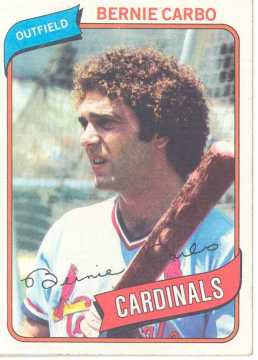Bernie Carbo—Topps Company—1980 (No. 266)
Pictured here in his last Topps trading card, Bernie Carbo epitomizes the caricature of the 1970s flake. With his unusually permed hair and his slightly dazed look, Carbo appears to be preoccupied with thoughts that have nothing to do with baseball. (And I’m not sure what Carbo did to the pictured bat, which appears to have been slathered in mud from bottom to barrel!)
Like many fans of the game, I usually perceived Bernie Carbo as I viewed this card—with amusement. Recently though, Carbo offered some sobering revelations about his life during a lecture in Worcester, Massachusetts. Not surprisingly, the roots of at least some of his bizarre behavior could be found in a habit that is something other than amusing, specifically a steady drinking problem that evolved into full-blown alcoholism by the time that Carbo reached his 19th birthday.
For those not familiar with the life and times of Bernie Carbo, he compiled a long list of "eccentricities" during a baseball career that spanned the decade of the 1970s:
*After an early-career trade that sent him from the St. Louis Cardinals to the Boston Red Sox, Carbo received a stuffed gorilla from former Cardinals teammate Scipio Spinks. Carbo’s new friend earned the name "Mighty Joe Young," in honor to the legendary film character from 1930s cinema. When on road trips, Carbo did not like to travel alone; therefore, he usually took his "companion" with him. In order to ensure that his pet "gorilla" would remain by his side, Carbo often paid for an extra ticket. For Carbo, it was well worth the expense.
*Shortly after joining the Red Sox, Carbo gave $20 to an older gentleman who was in the Boston clubhouse and asked him to fetch a cheeseburger and fries. Carbo thought the older man was a clubhouse attendant. He didn’t realize that he was actually Red Sox owner Tom Yawkey. Ah yes, that’s the way to make the boss feel important.
*Playing on June 26, 1975 in a game against the rival Yankees, Carbo made a daring catch at the right-field wall at Fenway Park, robbing Chris Chambliss of a home run. Carbo crashed into the wall, somehow escaping injury but managing to lose the chaw of tobacco he had in his mouth. Carbo then asked umpires for time, so that he could search the outfield for the missing chaw. After holding up the game for nearly ten minutes, Carbo finally found the tobacco lying on the warning track. He picked up the filthy chaw and put it directly back into his mouth, most likely to the disgust of the fans watching from the right-field stands.
*Carbo was one of the few major leaguers who harbored interest in becoming a professional hairdresser. (Please don’t think that I harbor any ill feelings toward the profession of hairdressing; it just seems a bit unusual for a major league ballplayer.) Following the end of his baseball career, Carbo went to cosmetology school and operated a hair salon for eight years. During his playing days, Bernie coifed his hair in a permanent, which was certainly not out of the ordinary for 1970s culture but was fairly uncommon for ballplayers of that decade.
At the time, many of Carbo’s habits were considered quaint—some still are—but some of his on-field mental lapses were likely influenced by his addiction to alcohol and drugs. Carbo managed to keep his drug problems quiet for much of his career, but talked openly about them after his retirement from the game. "I was a drug addict and alcoholic for 28 years," Carbo first told The Sporting News in 2001. "I started drinking when I was about 16 or 17, started on marijuana when I was 21, did cocaine when I was 22 or 23, and got into crystal meth, Dexedrines, Benzedrines, Darvons, codeine. There wasn’t much I didn’t do."
In 1989, Carbo’s problems escalated. His mother committed suicide. A few months later, his father passed away. Carbo himself then went through a divorce. He contemplated suicide. "I did not want to live in this world," Carbo admitted.
Fortunately, two of Carbo’s former teammates with the Boston Red Sox learned of his plight. Ferguson Jenkins and Bill Lee, both of whom had experienced their full share of personal problems, placed calls to Carbo. They convinced him to address his drug problems by entering rehabilitation. During his time in rehab, Carbo learned about Christianity. Embracing the values of the religion, Carbo became a Christian minister while also performing as a motivational speaker.
Though his ascent from depression and drugs has been laudable, Carbo’s travails have not ended. In addition to losing his mother through suicide, Carbo watched his three daughters land in prison because of their involvement with selling drugs. One of the daughters remains behind bars, which explains why Carbo is attempting to adopt three of his grandchildren, all under the age of ten. Carbo’s efforts to gain custody of the children has stirred debate on some internet baseball sites, with some dissenters claiming that his past involvement with drugs and alcohol should preclude the adoption.
I have no idea whether Carbo should be allowed to adopt those children. I simply don’t know him that well. But I have to admit I’m rooting for him. He was a good role player, an underrated hitter with power who sometimes walked more than he struck out. He was a likeable and fun personality who brought life to clubhouses in Cincinnati, St. Louis, Boston, and a few other ports of call in the 1970s. He has also overcome serious drug and alcohol addiction—at least for the moment—and has come back from the verge of suicide to do some meaningful work as a counselor and social worker.
I hope that Carbo can make that final step and complete the transition from caricature of the 1970s to reliable grandfather in the new millennium.



